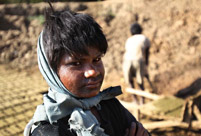Lack of an information-sharing network has bred fraud in China's rural health insurance system, and experts have called for stricter regulation and supervision to protect rural residents's rights and prevent misappropriation of their funds.
While hundreds of millions of rural Chinese benefit from the New Rural Cooperative Medical Scheme (NRCMS), which was initiated in 2003, scammers have been creating fake invoices and submitting them to the NRCMS managing center for reimbursement, siphoning huge sums of money out of the program.
As of 2012, the NRCMS had covered over 800 million people, or 98 percent of China's rural population. Under the program, every farmer is required to pay 60 yuan (about 10 U.S. dollars) per year, after which 60 to 100 percent of their medical expenses will be reimbursed.
However, frequent fraud cases have been reported across the country over the past few years, indicating that scam groups have been taking advantage of loopholes in the health care system and raking in heavy gains.
FRAUD CHAIN
A group of more than 50 scam artists was recently busted in south China's Guangxi Zhuang Autonomous Region for 63 cases of fraud, from which they took in over 2.6 million yuan, according to local police.
The suspects were found to have illegally obtained the personal information of more than 60 rural residents in Guangxi, which they used to claim reimbursements from the NRCMS using fake invoices.
Earlier in June, officials with the NRCMS managing center of Anma Town,in Guangxi's Yizhou City, found a stack of invoices filled out by a local teacher, who claimed to have suffered from colonitis while in neighboring Guangdong Province and had medical treatment there, with total expenses of over 50,000 yuan.
However, the teacher was found to have no medical records at the alleged hospital in Guangdong. Meanwhile, similar fake invoices were found in other counties, which led to the discovery and detention of the defrauders, who were scattered in a dozen towns.
The teacher confessed to police that a man surnamed Wei, who was an employee at a local NRCMS managing center in Guangxi, provided these invoices to him, according to Zhou Xiaodong, captain of the Economic Investigation Detachment of Yizhou's Public Security Bureau. The teacher, in collusion with Wei, submitted the invoices and received reimbursement.
The lucrative payouts contributed to formation of a fraud chain led by Wei, who said he collected, bought or stole personal information from farmers and gave it to one of his associates, who was in charge of buying invoices.
"In each case, we spent between 1,000 to 3,000 yuan buying a set of invoices, gave 2,000 to 4,000 yuan to a farmer to get his or her personal information, and raked in profits of more than 15,000 yuan," Wei said.
Police said the quick money has attracted many others, and the number of scammers has sprung up in the region.
FAKE INVOICES
Similar fraud scams, which experts say have been on the rise in recent years, have also been reported in rural areas in Hunan, Guizhou and Guangdong provinces and are spreading throughout the country.
In 2010, a local NRCMS managing center in Anhua County in central China's Hunan Province reported 35 cases of fraud using fake invoices to cheat money from the NRCMS.
One of the biggest obstacles to preventing fraud is that it is hard to determine whether invoices are genuine or not, according to police.
Wang Yuping, director of Yizhou's NRCMS managing center, said verification staff can only determine the genuineness of the invoices based on their experience, or by calling hospitals to verify the invoices. But the large number of participants enrolled in the NRCMS program means a huge workload for staff.
In the meantime, even double-checking via phone calls can be a big headache, as there can be evasion or delays on the hospital's side, making the verification process slow and cumbersome.
Adding to the mounting difficulties is the fact that some doctors act in collusion with those committing fraud, making it almost impossible to spot fakes among the numerous invoices.
INFORMATION-SHARING NETWORK URGED
As the amount of non-local medical treatment rises, experts have called on the government to establish a medical information-sharing network in the country to crack down on scams.
In October 2012, the National Health and Family Planning Commission, then the Ministry of Health, stressed the importance of speeding up creation of a national NRCMS information-sharing platform. One project would require 26 hospitals frequented by NRCMS participants in Beijing and six provinces to be connected via the platform.
The commission also urged other provinces and regions to quicken their pace in establishing similar platforms at the provincial level to achieve information sharing.
Such platforms will help various departments to check reimbursements, supervise NRCMS funds, and analyze and evaluate NRCMS-related information, said Wang Yuping of Yizhou's NRCMS managing center.
Wang said the information-sharing network will guarantee the safety of NRCMS funds, because it allows staff to check the authenticity of the invoices online. The information will also be put into the patients' credibility records.
Wang proposed that such networks should be built on the national level, because the reimbursement systems vary in different areas, and a national network will make the verification process easier.
In addition, China should issue standardized medical invoices, which would be more convenient to check and manage, said Zhou Xiaodong of Yizhou.
Zhou said the society should step up supervision of the NRCMS, and anyone who reports fraud cases to the public security bureau should be rewarded.
"We should call on rural residents to abide by the law so that their own money can be better protected," he said.
 Low wages Indian migrant laborers
Low wages Indian migrant laborers Five fighters in flight training
Five fighters in flight training London mayor hails free trade, subway system on China tour
London mayor hails free trade, subway system on China tour Different eye catching shows at housing fairs in China
Different eye catching shows at housing fairs in China Special family portraits call attention to left-behind children
Special family portraits call attention to left-behind children Migrant children’s pain and joy in city
Migrant children’s pain and joy in city Lingerie show dazzles Wuhan Motor Show 2013
Lingerie show dazzles Wuhan Motor Show 2013  Running in fun customs at Beijing Int'l Marathon
Running in fun customs at Beijing Int'l Marathon  Weekly Sports Photos
Weekly Sports Photos Chinese riot police take Liberia peacekeeping mission
Chinese riot police take Liberia peacekeeping mission World has never been dark-- a blind kid’s life in Tibet
World has never been dark-- a blind kid’s life in Tibet Oriental education or western education?
Oriental education or western education? China in autumn: Kingdom of red and golden
China in autumn: Kingdom of red and golden U.S. Senate leader announces bipartisan deal
U.S. Senate leader announces bipartisan deal Chinese screen goddesses from Beijing Film Academy
Chinese screen goddesses from Beijing Film Academy Day|Week|Month